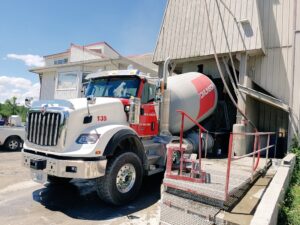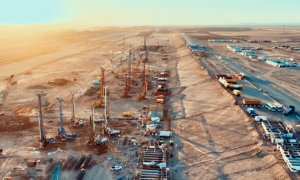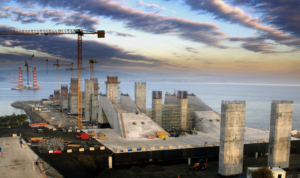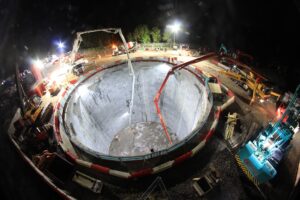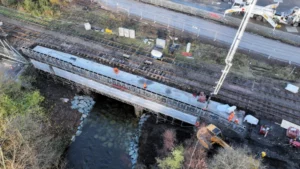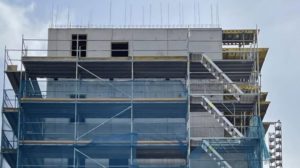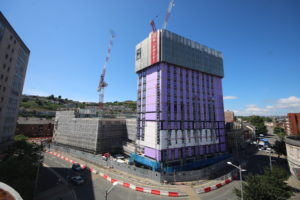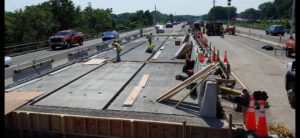The Challenge
Central Concrete, a U.S Concrete Company, was contracted by Pacific Structures to supply the ready-mix concrete for the 415 Natoma project –a 27 floor multi-use building in San Francisco, California.
One of the primary requirements on the project was for Pacific Structures to be able to monitor and report on the tower crane pad concrete temperature for 72 hours to ensure it did not exceed the specific temperatures of 160°F. This included a max delta of 35 degrees Fahrenheit between the surface and the core as required by ACI 318.
The Solution
Patrick Frawley, Director of Quality Control and Ramiro Vera, the Project Manager from U.S Concrete knew that this would be a perfect situation to utilize Giatec’s SmartRock® sensors.
U.S. Concrete Company is a SmartRock® Plus partner of Giatec. They utilized the SmartRock sensors on the 415 Natoma project to monitor the temperature of the tower crane pad footing and the mat slab.
The Results
The tower crane pad and mat slab were poured continuously to a depth of 6 feet and 13 feet, respectively. Central Concrete installed four 10-foot SmartRock sensors and four 16-inch sensors for the mat slab and two 16-inch sensors for field-cured cylinders.
The sensors were successfully installed for each lift of the tower crane pad. Pacific Structures was able to get temperatures readings from the SmartRock sensors directly on their mobile device via Bluetooth. Having real-time temperature readings at all times gave them the confidence to report to the General Contractor, Swinerton, that they stayed below the 160°F threshold and there were no issues with thermal cracking of the concrete. Figure 1 illustrates temperature data of the curing tower crane pad and the average temperature of the field cylinders used for early-age strength measurements.
Field cured cylinders can be improperly cured, especially when they are exposed to ambient conditions. This makes them an inaccurate indicator of the true strength of a mass concrete element that will produce much more heat. Incorrect field cured cylinders can lead to low breaks and project delays – like pushing back the time to erect tower cranes.

More Than Just Temperature Data
In addition to measuring temperature, SmartRock sensors can also be used to calculate the real-time strength of concrete via the maturity method, or ASTM C1074. In California and the Bay area, field-cured cylinders are the norm for early-age strength assessment of critical operations, such as erecting tower cranes.
Utilizing the maturity method provides real-time strength data of concrete, instead of waiting for break tests of field cured cylinders. For the 415 Natoma project, the cylinder breaks were timed to line up with the erection timeline based on the concrete mix design strength history. By implementing the maturity method using SmartRock sensors, U.S. concrete has the ability to know the real time strength of the in-place mass concrete. This data can be used to accelerate the timeline of the tower crane pad inspection and crane erection.
Figure 1 shows the difference between the heat generated by the tower crane pad and the tower crane field cylinders (TC FC). Further, Figure 2 illustrates the difference in strength gain from the field cylinders and in-place concrete. The project required a construction strength of 4500 PSI to load the tower crane pad. Figure 2 further shows the time required to achieve the 4500 PSI with field cylinders versus in-place maturity sensors. The benefit of maturity testing is not just for tower crane pads. It can be utilized in all types of structures.

“We’ve successfully implemented SmartRock maturity sensors on numerous projects around the Bay Area. We’ve not only been able to give our customers real-time access to their concrete temperature but by leveraging maturity, our customers have reduced their costs and accelerated their project timelines.” – Ramiro Vera, Project Manager, U.S. Concrete.
Central Concrete has been providing maturity as a service to its customers since 2018 through its partnership with Giatec – the world’s leader in wireless concrete maturity sensors. Central Concrete are forward thinkers who are driving the adoption of the maturity market in the Bay area and hope to bring the benefits of maturity to all California projects.

